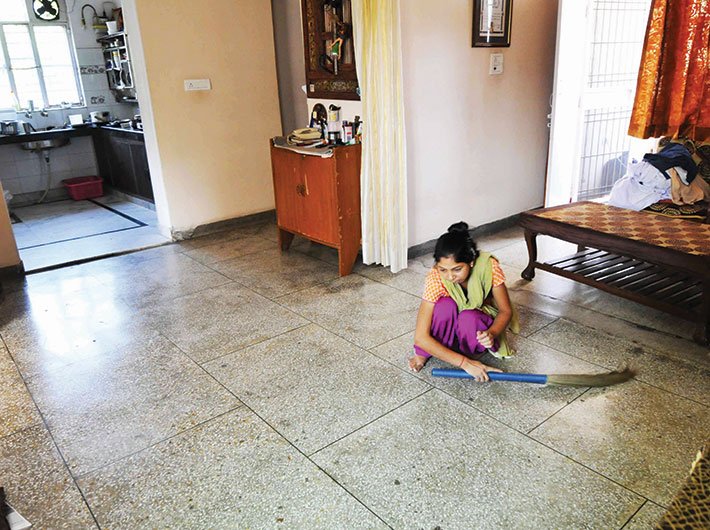Can you guess the connection between Kuwait and the remote villages in Chittoor district of Andhra Pradesh? Hint: Wealth lures poverty.
Kuwait has money and jobs, while the villages in AP abound with people who have no hopes of ever making it good. Whatever they may do, they would not be able to fulfil their dreams to see their children go to city colleges or study abroad. Yet the aspiration never ceases.
So one fine day in March this year, when a local villager, in Sadum in Chittoor district, known for his connections in Kuwait, suggested a job for Suma (name changed), her husband Prakash didn’t want to miss the opportunity.
Suma worked in a nearby school. Her job was to clean the hostel and be on call the whole day for any other requirement. She earned about Rs 3,000. She has two little boys; both less than three years.
She was just 22 and strikingly beautiful. Prakash worked at a local petrol pump and earned Rs 6,000 a month.
A job in Kuwait was not a chance to miss. Suma put in her papers at the school and left for Kuwait within two days seeking a bright future. She had got a job as a domestic help.
She would be earning Rs 25,000 a month, her relatives claimed – a dream amount that promised to end her family’s troubles.
But what was the guarantee of her safety? And how would that compensate her separation from her little children and husband? These questions had no answers.
Her mother-in-law was the only person at her home when this writer paid a visit. She had made all the calculations about her daughter-in-law’s future. “We have a lot of debt. So the first year we would pay all that off. From the second year onwards we can save for her children,” she said.
On one hand, Suma’s family is hopeful of making it big in Kuwait, but on the other hand, Rani, Suma’s cousin, dreads at the mention of Kuwait. Rani’s mother works in Kuwait. Her mother’s two siblings have also been working there for the past two decades. Rani’s aunt was sold to another country. “My uncle and my mother then raised enough money to get her back,” she says.
“No one talks about these things when they come back. The first thing they do [in Kuwait] is take our visa and passport and return it only when they want us to go. It has happened with all my relatives,” she adds.
Deciding to put an end to such abuse of workers, the Indian government in 2015 demanded that the Kuwait government should provide a financial bond of $2,500 from every employer for every worker it takes. Kuwait refused to do any such thing. India also created a digital migration pathway to ensure that every migrant was accounted for and their rights protected. But both these moves received a cold response from the gulf countries, especially Kuwait and the UAE.
But this did not curtail Indians migrating to Kuwait for work. “In response to an RTI query, the Indian embassy in Kuwait revealed that 50,000 visas have been issued to Indians between 2015 and now,” says Rafeeq Ravuther, director, Centre for Indian Migrant Studies in Thiruvananthapuram.
These workers must have gone on a guarantee from their employers, says Sister Lizzy, Andhra Pradesh state coordinator for National Workers Movement.
But guarantees were paid for those who went through the official channel on proper visas. “Those who went through agents and on ‘visit’ visas got no such guarantee. This is a shady zone and no one knows how many women went through these unofficial channels,” adds Sister Lizzy.
In October 2017, the Indian government relaxed the migration norms and withdrew the demand of guarantees from the employers – a retrograde step.
The Indian government has made a list of six agencies which are solely responsible for the recruitment of domestic workers in Kuwait. And if workers go through these agencies then the Kuwaiti employers don’t have to pay any guarantees, says sister Lizzy. There is also no guarantee if some sort of protection will be provided through these channels, she adds.
Most workers, however, choose unofficial agencies and go on ‘visit’ visas without informing anyone. So the need of the hour for the government and the official agencies is to set up workers resource centres in places which are known as migration pockets, suggests Sister Lizzy.
Lack of information is the main problem as far as domestic workers are concerned whether in India or in Kuwait.
Recently, the Kuwait government offered full amnesty to all the migrants who did not have legal papers and allowed them to return home. Around 1,30,000 Indians were expected to benefit from this offer, as per a report in Kuwait Times. And yet only 10,000 people have approached the Indian embassy in Kuwait with requests to go back.
“How can domestic workers living in some remote parts of Kuwait come to know of the amnesty offer and approach the Indian embassy? Any help is not accessible to them,” says Sister Lizzy.
They can be accessed in churches or parks and any information has to be given through these channels, she suggests.
The government may change a policy and refine it, but it can help the domestic workers only when they are made aware about it. People like sister Lizzy are not available for workers before they leave. “They don’t approach us before leaving and go on their own. We find out about the bad cases through families they leave behind,” she says.
Suma’s migration to Kuwait highlights that workers are still making a beeline for the rich Arab countries.
The most heart-rending thing about trafficking of workers is in the way it is done. The more it goes underground, the more risky it becomes for the women. For instance, in Suma’s case, she boarded a flight from Hyderabad to Dubai all alone. For a girl who has never stepped outside her village and can’t speak any language except Telugu, flying alone would have been a nightmare. From Dubai, she took another flight to Kuwait.
While Suma is able to talk to her family on phone, she cannot return home for five years as per her agreement. “She cried a lot one day. She said that she had to work a lot, even during festivals,” recalls Sudha, Suma’s cousin.
In her village there are two other women who have been to Kuwait but are now back for good.
Indrani was in Kuwait for 16 years. Every two years she would get a round-trip ticket to India. She was 26 when she left, leaving behind her husband and three small children.
Her husband died a year ago. Just two years after she returned.
She used to earn a measly Rs 6,000 a month in the beginning, which increased to Rs 10,000 by the time she came back.
Her achievements? Her daughter has completed MSc in nursing while her eldest son is a conductor in the state transport corporation. The youngest is a teacher in a government school. What more could she want?
“Yes, it was difficult to leave my little ones. But I had no choice,” she says.
“Without an education how can you earn Rs 20,000?” she asks, adding, “I wanted my children to be educated.”
Though her employers in Kuwait were good to her, she says that she was not allowed to come to India when her mother died. “Now my children don’t let me go back,” she says.
Her cousin Parvati lives nearby. Like Indrani she has also come back after working in Kuwait for a long time – 17 years. She is disillusioned by her experience.
Parvati left for Kuwait when she was barely 20. “I used to come home every two years and I got married in between. After that I decided to put an end to it,” she says.
“I was earning up to Rs 15,000. Once when I returned, my husband met with an accident and all my savings went into his treatment. He and his first wife’s family cheated me of all my money,” she says.
“I was left with my son and now I don’t want to go back to Kuwait to earn. If I go I will earn a lot. But I don’t want to waste my life there,” she says hugging her little son.
“I have spent all my life working there. Now, I want to rest,” she adds.
These women are links in a long chain of migrations to Kuwait from rural AP. And if the latest case is taken into account, the story has not come to an end.
Kuwait and many Middle East countries follow the kafala or sponsoring system which is a sort of medieval practice where the worker is almost reduced to a bonded labour.
Under this, the employer has the right to keep the worker’s visa and travel papers as security against his/her leaving the job. This restricts the worker from either changing jobs, or leaving the country when his/her life is in danger.
If the worker chooses to run away, then he/she might land in jail for travelling without papers. So the domestic worker is at the total mercy of the employer.
In April this year, the Philippines government banned workers from its country to go to Kuwait in search of employment as Kuwait had refused to give any kind of security for the worker’s safety. The ban was imposed after the body of a Filipino domestic worker was recovered from the freezer of an employer. The Lebanese employer was later arrested. Since majority of workers in Kuwait are Filipinos, Philippines arrived at an agreement with Kuwait and lifted the ban in May.
Rafeeq Ravuther of the Centre for Indian Migrant Studies runs a TV programme in Kerala which tells stories of migrations that have gone wrong and tries to save people from falling prey to Gulf countries. So far, he has brought back 50 women domestic workers from various Gulf countries.
“Majority of Indian women workers in Gulf countries are from Andhra Pradesh. The new policy decision to have all migrations routed through six agencies is welcome. But unless this information reaches people in villages and their trust is earned, they will keep paying Rs 2 lakh to illegal agents and go to Kuwait on ‘visit’ visas risking their lives and safety,” says Ravuther.
In response to Ravuther’s RTI query filed in February 2018, the Indian embassy in Kuwait revealed that it received about 2,250 complaints from Indian domestic workers in 2017; 950 of them were women.
Among the grievances reported were non-payment of promised salary, holding of workers’ passport, ill treatment and harassment, long waiting hours and improper medical treatment, non-grant of leave in case of emergency situations back home, and visa trading.
Caught between absolute poverty and the hope of making a quick transition from poverty to affluence, rural families in Andhra Pradesh tend to overlook the risks or the pains they have to undergo as they send young women to Kuwait.
feedback@governancenow.com
(The article appears in July 31, 2018 edition)

